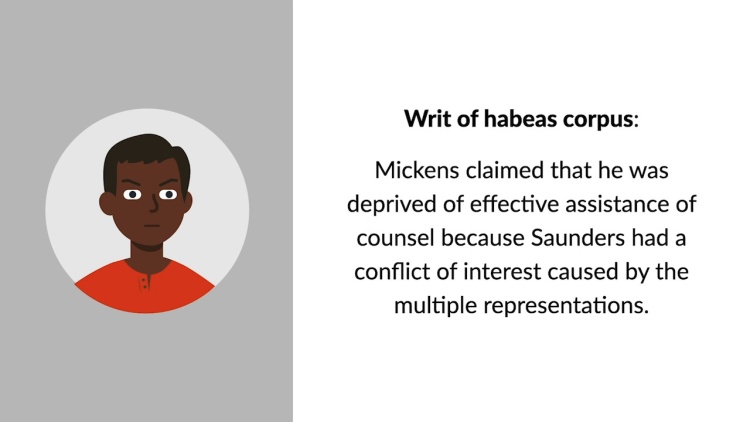Mickens v. Taylor
United States Supreme Court
535 U.S. 162, 122 S.Ct. 1237, 152 L.Ed.2d 291 (2002)
- Written by Matthew Kay, JD
Facts
Mickens (defendant) was convicted of the premeditated murder of Hall, and he was sentenced to death. Five years later he filed a petition for a writ of habeas corpus. In the writ he alleged that he had been deprived of effective assistance of counsel because one of his court-appointed attorneys had a conflict of interest, namely, his lead trial attorney Saunders had represented Hall at the time of the murder. Three weeks after Saunders had met with Hall, who was then murdered, Saunders was appointed as counsel for Mickens. Saunders did not tell Mickens that he had represented Hall, but Mickens learned about the previous representation when a clerk mistakenly gave Hall’s file to federal habeas counsel. The district court held an evidentiary hearing, but denied the habeas petition. The court of appeals assumed that the juvenile court judge had neglected a duty to inquire into a potential conflict of interest, but at the same time rejected Mickens’s claim that this failure to inquire required either a mandatory reversal of his conviction or relieved him of the burden to show that the conflict of interest had negatively affected his representation. Following Cuyler v. Sullivan, 446 U.S. 335 (1980), the court of appeals held that a defendant must show “both an actual conflict of interest and an adverse effect even if the trial court failed to inquire into a potential conflict about which it reasonably should have known.” The court of appeals said that Mickens had not shown any adverse effect and affirmed the district court’s denial of habeas relief. The United States Supreme Court granted a stay of execution and granted certiorari.
Rule of Law
Issue
Holding and Reasoning (Scalia, J.)
Concurrence (Kennedy, J.)
Dissent (Breyer, J.)
Dissent (Stevens, J.)
Dissent (Souter, J.)
What to do next…
Here's why 907,000 law students have relied on our case briefs:
- Written by law professors and practitioners, not other law students. 47,100 briefs, keyed to 996 casebooks. Top-notch customer support.
- The right amount of information, includes the facts, issues, rule of law, holding and reasoning, and any concurrences and dissents.
- Access in your classes, works on your mobile and tablet. Massive library of related video lessons and high quality multiple-choice questions.
- Easy to use, uniform format for every case brief. Written in plain English, not in legalese. Our briefs summarize and simplify; they don’t just repeat the court’s language.





